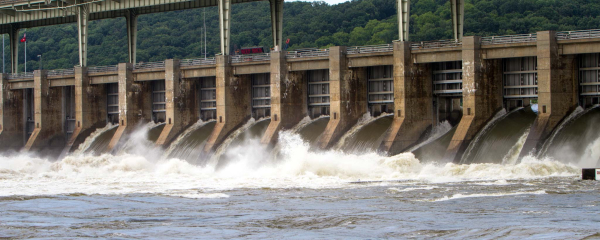2020 is now officially the wettest year ever recorded in the Tennessee Valley.
“The last three years have been a remarkable stretch of above-average rainfall,” said James Everett, senior manager of TVA’s River Forecast Center. “Before 2018, the previous record had stood for 45 years. Since 2018, we’ve either set a record or come close to it every year. And the 2020 record comes with two weeks left in the calendar year, so it will likely increase.
“Also, between Oct. 1, 2019, and Sept. 30, 2020, the Tennessee Valley recorded 75.74 inches of rainfall. This was the wettest Fiscal Year total ever in the 131-year period of record.”
A Very Busy Year
The above-normal runoff from rainfall has persisted throughout the entire year, with one notable exception: the 2020 record comes after a month of below-average rainfall just last month. November rainfall in the Valley totaled 2.34 inches which were only about 62% of normal monthly rainfall. That shortfall ended a streak of 13 straight months of above-average rainfall, which is also a Valley record.
This year, TVA has worked to avert about $1 billion in flood damages throughout the Valley, keeping several cities from being submerged each year. TVA’s reservoir management saves the region about $300 million. TVA has averted more than $9 billion in flood damages since it completed its first dam, Norris Dam, in 1936.?
Throughout the record rains, TVA uses its 49 dams to manage lake levels and river flows to balance the competing demands of the reservoir system. Whether heavy rains or drought, TVA’s River Management Team works around the clock, managing the Tennessee River system to provide a variety of benefits, including flood control, navigation, hydroelectric generation, recreation, water quality and water supply.
“Managing the Tennessee River system during this extended period of record rainfall continues to be a team effort of the River Management, Hydro Generation and Dam Safety staff at TVA,” Everett said. “The sites and crews in the field have put in countless long days maintaining and operating equipment like sluice gates, spill gates, cranes and, of course, hydroelectric generators which are all necessary to control flow through TVA reservoirs.”
Learn more about how TVA manages the reservoir system for multiple benefits.
Editor’s Note: Catfish anglers are probably are not surprised by this report. They might just use the information to their advantage though. High water times can be both dangerous and productive. Brad Durick says, “Many catfish anglers choose to stay home and wait for a better day. Only a few understand the magic that awaits in this situation.”
You can read Brad’s tips for catfishing in high water by clicking here.



